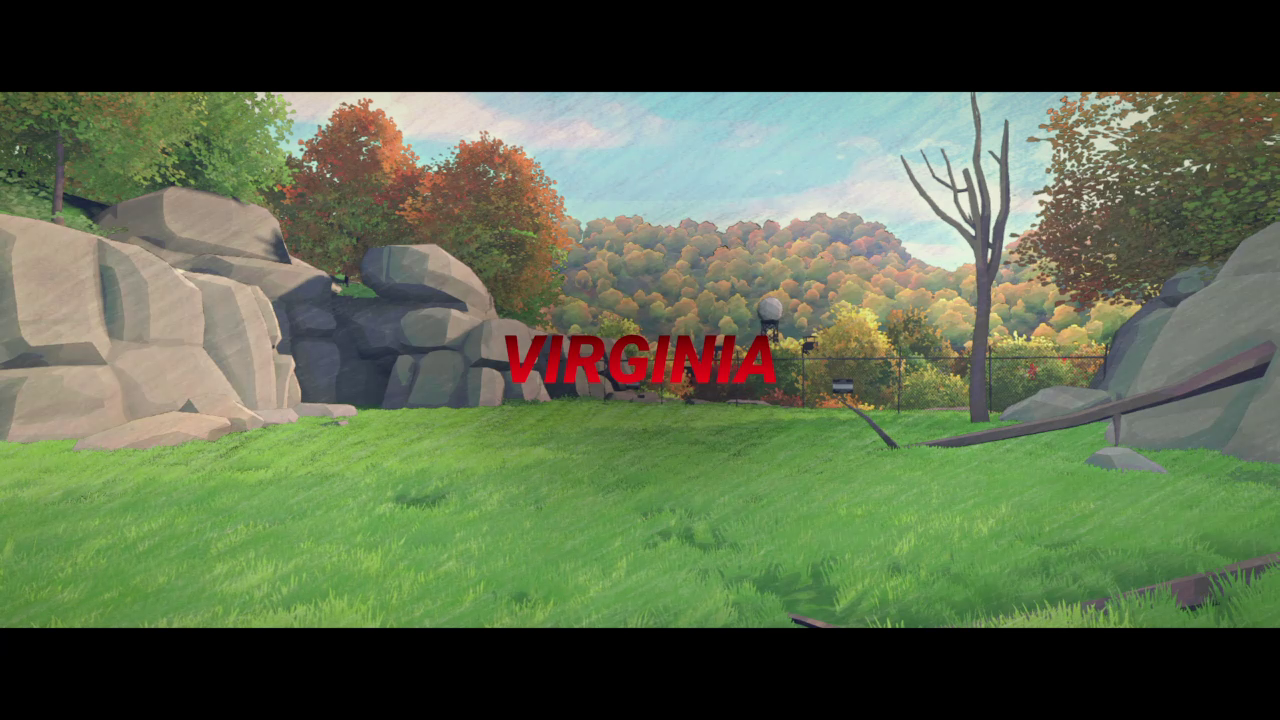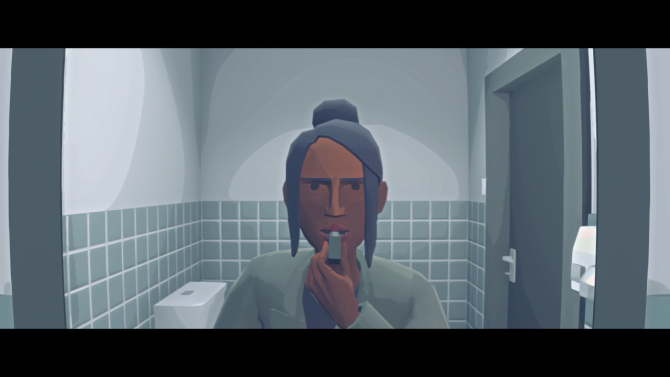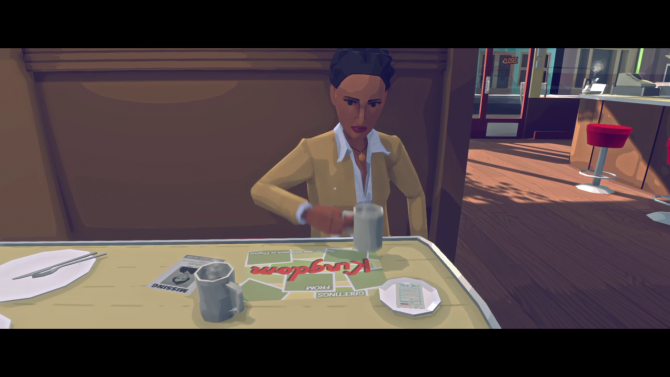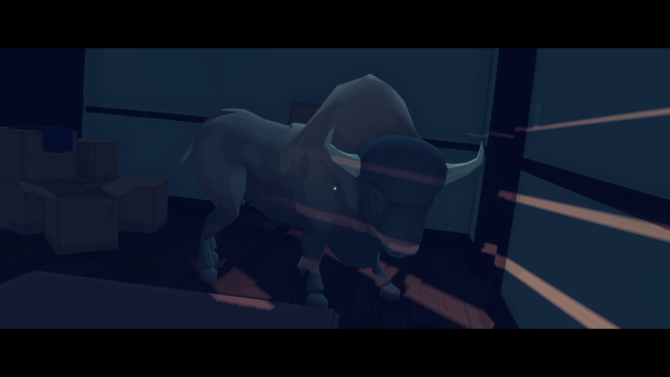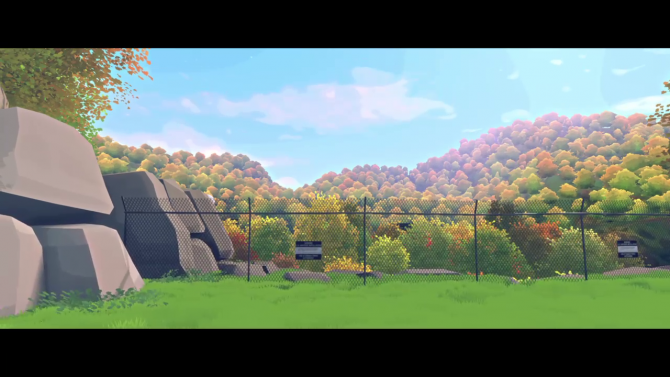Virginia is a game about a recent inductee named Anne Tarver into the FBI as a special agent. Assigned to investigate into a fellow operative, Maria Halperin, you are partnered up with said subject to also look into a missing person's case in a small town in Virginia. Besides walking from point A to point B, you aren't doing much. You can walk and explore the hallways and rooms you are placed in, but there is not much to actually do in those areas.
Most of the time there is a single action you can take to progress the narrative. This is indicated by the reticle in the center of the screen turning from a dot into a circle, and then into a rhombus when you are close enough. Frequently it is a door, sometimes a collectible of sorts, and other times a character. A majority of the spaces you are placed into will be empty of anything to interact with, instead full of bland and generic emptiness of books with no text, rooms with minimal decorations, and nothing substantial to draw your attention. Sometimes you will even be restricted to a seat and can only look around at the surrounding environment and characters at play.
Due to the limited interactivity, the main way to keep a player interested would be with the narrative, and at least for the first half Virginia succeeds at that. The tension of growing close to the partner you are at the same time looking into for misdeeds is present. Looking into what might have caused the disappearance of the son of a pastor who sleeps in a separate bed from his wife is another compelling thread to keep you invested.
However, neither of these really go anywhere definitively. It is hard to state that with confidence since the final section of Virginia devolves into a series of abstract scenarios and images that are supposed to convey some sort of message, one that I did not receive.
While the map you are shown on the pause screen would seem to indicate a large town you get to explore, you are very much restricted to whatever the game presents. Whether it be your apartment, the missing child's house, the seat at a diner, your work office, or an elevator. You only ever push forward, never backyard, or even to the side. This would be fine if it had a compelling story with a satisfying conclusion, but Virginia significantly fails at this aspect.
There is only one narrative being pushed during Virginia's two hour runtime, and no branching paths that might have passed me by. I spent time in the empty rooms looking for something, anything that may have added some information to my mystery. Instead I would progress through the hallway of each day and be greeted at the end with dream sequences that included elements of the events and characters of the daytime.
These were fine at first, as they involved imagery I had happened across, just not in the same scenario. Eventually though it started to be hard to determine what was reality and what was simply my own internalized visions. This culminated in the ending, which became such a nuisance of pushing the left stick forward that I simply wanted it to end, full stop.
I won't spoil the final scene, but suffice to say I was very unsatisfied at the conclusion. I was also a bit bewildered given the positive reception I came across elsewhere, especially given my opposite reaction. Early on I questioned whether or not this would have made a better movie than game, given the lack of agency I hold in it. This was also pushed forward in my mind due to the cuts frequently implemented during the game. Most scenes will end with a hard cut of you sitting down looking at something or someone, or walking forward, only to be placed in an entirely difference scene.
It is very much like a movie, in that it serves as a transition between one location and the next without showing the boring way we got there. Except that it occurred while I was walking forward, which proved jarring and hard to adapt to. Despite that I still feel like the first person perspective, and the control I had on the character, no matter how limiting, did give me a certain investment in what was occurring, more so than a film could. This helped, because I lost a chunk of that investment in the latter portion of the game.
Graphically the game looks great with a stylized art style that is reminiscent of more advanced PlayStation One polygon characters. It is hard to describe, but everything was presented in such a way that it was simplified, sometimes too much so.
There is no dialogue at all in the game, instead relying on character movement and the orchestral score to convey emotions and the gravity of certain images. The score was great, though utilized a little too often that the importance of certain cues started to fade because of their repetitiveness. While the game performs well most of the time, it continued to drop in frames whenever I would visit this large open area near a cave. Whenever I would swing the camera view on the x-axis it would dip.
I wanted to enjoy Virginia, but the nonsense ending left me annoyed and puzzled as to its meaning. Even playing a second time, I still am not sure what really happened. Some aspects I understand, such as a scenario in which the player character ascends to her bosses rank and basically becomes him down to both the smoking and tossing a file to the person at your desk. I had someone else play for any insight, but the continual edits and metaphysics left them confused as well. There may be something there for others, but for me it was simply a good mystery gone wrong, and not one I enjoyed upon completion.

